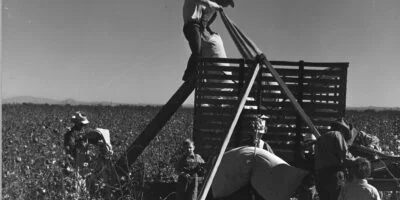Socialists and their Silly Stories

My dear friend Roger Meiners, Professor of Economics at the University of Texas-Arlington, tells of a former colleague of his whose interpretation of reality should teach us all an important lesson. Roger’s colleague, a devout Marxist, once announced that the always-full shelves at American supermarkets are evidence that capitalism is failing. You read that right: failing.
This interpretation of the meaning of always-fully-stocked supermarkets is, to describe it mildly, odd. After all, even Hollywood script writers interpret the bounty available in U.S. supermarkets as proof of the superiority of capitalism over communism. Recall the glorious scene from the 1984 movie, Moscow on the Hudson, in which Robin Williams’s character is thrown into happy delirium upon first seeing in an American supermarket the incredible selection of coffee.
How, then, is it possible for anyone seriously to propose that full supermarket shelves indicate market failure? The answer is surprisingly easy, at least – and ironically – for anyone who knows a bit of economics. Roger’s colleague pointed out, correctly, that ECON 101 teaches that when free markets are working they “clear” – which means not only that sellers make available for sale all that buyers want to buy at market prices, but also that buyers buy all that sellers make available for sale at those prices.
And so when Roger’s Marxist colleague notices that American supermarket shelves always remain full at the end of each day, what he sees is that buyers regularly fail to buy all that sellers make available for sale. This Marxist, therefore, concludes that American capitalism is wasteful because it daily fails, contrary to the apparent prediction of ECON 101, to clear markets of all available supplies.
Get Your Stories Right
No reader of AIER columns needs a detailed explanation of just why full supermarket shelves are evidence, not of capitalism’s failure but, instead, of its success. Consumers value (meaning: they willingly pay for) expansive product choice and the assurance of – and even the accurate appearance of – ample supplies. Supermarkets meet this consumer demand by keeping on hand substantial inventories of many different kinds of products. These inventories ensure against unexpected runs on groceries (and avoid the need to be constantly restocking shelves).
Yet the fact that full shelves can be so easily interpreted as evidence of capitalism’s waste and failure is telling. As Jonathan Haidt demonstrated in his 2012 book, The Righteous Mind, the human brain has a remarkable capacity to see whatever it wants to see, and to find reason for believing whatever it wants to believe.
This reality about human cognition and belief presents a challenge to anyone wishing to make a case for free markets. If the (pre-COVID-19) abundance of goods in supermarkets does not on its own testify loudly and unconditionally to the glories of capitalism, what does? The correct answer, alas, is “nothing.” Objective reality – any set of observable facts – does not speak for itself. We humans interpret even the simplest facts only through the stories that we tell ourselves about those facts. (We give the name “theories” to stories developed with special care and meant to apply to more than one particular set of facts.) As the example of Roger Meiners’s Marxist colleague makes clear, a change in the story told about facts can alter dramatically our perception of reality and, hence, the lessons that we draw from our observations.
The centrality of stories to our understanding of reality does not mean that all stories are equally valid. Some stories open our eyes to aspects of the real world that other stories miss or even mask. The Marxist’s story of markets each day “failing” to clear off all supermarket shelves blinds those who accept it to the value of having adequate inventories on hand. A much more plausible story about full supermarket shelves – a story that tells of the value of wide product selection and of ample inventories – is available and, of course, should be told.
Our Crisis Stories
So what stories will we hear about today’s COVID-19 crisis? Because the number of incomplete or misleading stories is necessarily greater than is the number of ‘complete’ and revealing stories, we can be certain that a large number of distorting stories will be told.
One story certainly will be that the steps that governments took to lock down the global economy were responsible and necessary for humanity’s escape from the worst horrors that COVID-19 would otherwise have visited upon us. This story seems obvious enough: the virus hit, governments then shuttered most of the economy, and then there followed the diminished threat of the virus.
But different and more compelling stories will be available for the telling. Such stories can, and should, tell of how alternatives to the heavy-handed, sweeping shutdown might have protected us from the virus at least as well, and perhaps even better. These different stories can tell also of consequences that the government-as-courageous-and-decisive hero story will skip – consequences such as how the diminished material prosperity caused by the shutdown actually decreased our health and safety over the long run, and of how governments’ restrictions on the building of hospitals, on the development of drugs, and on the licensing of physicians obstructed our ability to respond to the virus as quickly as possible.
Simple-minded stories will also be told of how trade with foreigners makes us more vulnerable to pandemics and less able to protect ourselves. These stories, too, must be countered with fuller and more-compelling stories. Such better stories, based in fact, will tell of how free trade, by diversifying our sources of goods ranging from foods through chemicals to medical products, ensures the robustness of our access to such goods. These better stories will also reveal the heightened hazards to our health and safety that we would suffer directly from protectionism: to the extent that they are shielded from foreign competition, domestic producers have weaker incentives to improve, and even to maintain, the quality of their outputs, including that of their medical supplies.
Be assured that there looms a battle of storytelling. Stories with simple, almost childish narratives – ones featuring haloed heroes selflessly battling black-caped villains – will pour forth. Many such stories are already in wide circulation. Because such infantile stories are easy to follow, they’ll win large audiences. But friends of truth and freedom must not despair. The stories that we can tell and share about the same reality will be more complete. It is up to us to make our stories also more compelling.
We must challenge, with better stories, the cartoonish tales that are now spreading virally and that threaten to become a calamitous intellectual pandemic.










